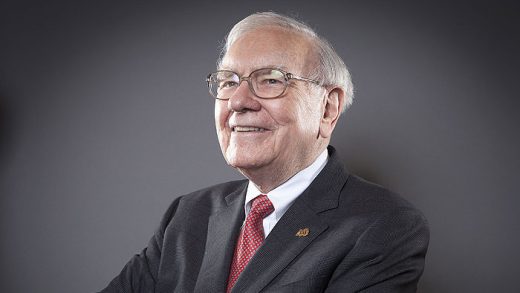Chad Richison was a wrestler as a child and worked part-time delivering hay to farmers. The skills he acquired in those years helped him create a service that makes it easier for companies to make payments to employees, and to overcome the obstacles that prevented the business from going public. In six years, his company’s stock shot up 1,800%, he was listed on Forbes, and dozens of his employees became millionaires.
It’s early November, and the sun is shining brightly outside the old-fashioned Around the Corner diner in the college town of Edmond, Oklahoma. Flags of local soccer teams adorn the walls, but Chad Richison, 49, is thinking about a different sport.
“It takes a lot of humility to go to the mat in a wrestling tights and get twisted in 17 seconds in front of all your friends. Once you step on the mat, the rest doesn’t seem so hard,” he says.
Richison wrestled in high school and college. Often he would train with special intensity to lose weight and move up to a lighter weight class. In 1989, at the height of his wrestling career, he competed in state high school championships. Even though he traded in his wrestling tights for a business suit decades ago, that poise and modesty serve him well when he challenges much more serious opponents to a fight.
Today Richison is the founder and CEO of Paycom, an Oklahoma City-based software company with revenues of $695 million last year. The company has so far captured just 5% of the U.S. HR software market, which is now estimated at $20 billion. Meanwhile, Paycom is growing noticeably faster than its competitors. According to consulting firm Morningstar, about 50% of all Paycom’s new customers have come from rival corporations, ADP and billionaire Tom Golisano’s Paychex. Since going public in 2014, Paycom’s stock price has risen 1,800%, making the company’s securities one of the most profitable investments in the U.S. stock market at the time. Richison owns 14% of Paycom, which puts his net worth at $2.4 billion, enough to be one of the 400 richest people in America.
Payroll may not be as tricky as wrestling, but it’s an important business process that affects virtually all employees. Tens of millions of workers across America still have to manually enter hours worked into digital forms, which are then reviewed and approved by upper management. Thanks to Paycom, all of these procedures can be eliminated. As a leader in cloud-based HR solutions, the company offers employees’ locations (such as entering and exiting the office) to be tracked automatically via a smartphone app. Other organizations are doing similar solutions, but Paycom was one of the first to switch to processing payroll transactions exclusively online and integrate services for this and many other areas into a single application with an intuitive interface. From the very beginning, Richeson placed special emphasis on bypassing competitors in two key aspects: ease of use and security of operation. For example, customers were able to subscribe to a wide range of services from hiring to firing using a single cloud-based database. Paycom’s own rigorous corporate culture also played a role in sustained sales growth and increased profits.
“Paycom has always been one step ahead. The company built its platform from the ground up and put a lot of emphasis on employee self-service, which has made it so easy for them to learn the product,” explains Nandan Amladi, a software analyst at investment firm Guggenheim Partners.
The credit card business
Richison prioritizes employees out of respect for people’s hard work. He talks about his childhood: “If you wanted something, you had to work hard for it. The future businessman was born into a family of a milkman and a dental assistant. He spent the first six years of his life in a poor neighborhood in southern Oklahoma City, then moved to the small town of Tuttle. At age 11, Chad began hauling hay for local farmers and eventually, by the time he was 17, he made enough money for his own truck. After buying a Chevrolet Viking and welding a cargo platform to the back, Richison hired school friends and set up a small hay hauling business that managed to haul 1,200 bales a day.
At the University of Central Oklahoma, the young entrepreneur earned a degree in journalism and studied German at the same time. He attended only one course at the institution’s business school. But after graduation, he immediately accepted a job offer from ADP, his first exposure to the payroll industry. He worked for the company for two and a half years. During that time, he met Jeff York, who became his sales mentor and later joined him at Paycom in 2002 and became director of sales in 2007. Then Richison left ADP for a small office that handled employee payroll in Denver.
Richison soon decided to move back from Colorado to his home state: he sold a house in Denver, applied for a loan from the Small Business Administration and cashed in his retirement account to start his own company in 1998. He later had to use 13 credit cards to keep the business running. Few people used the Internet back then, and hardly anyone had heard of Google at all. According to Richeson, payroll processing was ready to take things to a whole new level. The field was so conservative that it had hardly changed in any way since the 1940s. Everything was done the old-fashioned way on complicated paper forms, and employees, like managers, had to fill out a lot of paperwork for even the simplest tasks like recording hours worked or requesting paid leave.
“Chad realized the business benefits of the Internet before anyone else,” says Brad Riback, managing director of Paycom Services at Stifel Investment Bank. – He put a lot of emphasis on using technology on mobile devices. Everyone usually comes to that, but Chad was one of the first.”
Deferred IPO
Leaning slightly forward in his leather chair, Ritchison, wearing a new white shirt, goes through a pile of folders with early drafts of Paycom programs in his wood-finished office in northwest Oklahoma City. He stops at a page with simple rectangular blocks and terse commands like “prepaid check,” “invalid check,” etc. “A page like this could take me all day,” the businessman recalls.
Using forms from other payroll operators as templates, Richison designed every page and button in Lotus Notes, Microsoft Word and Paint for the platform’s online interface himself. At first, no one in Oklahoma City was interested in his product, mostly because businesses simply didn’t want to trust their businesses to a local company founded only recently. So Richison began driving around to nearby cities like Stillwater and Pauls Valley, where many potential customers didn’t even have Internet access. The Paycom executive emphasizes: “I was actually the first one to show them the Internet and tell them what it was. They were terrified of it.


